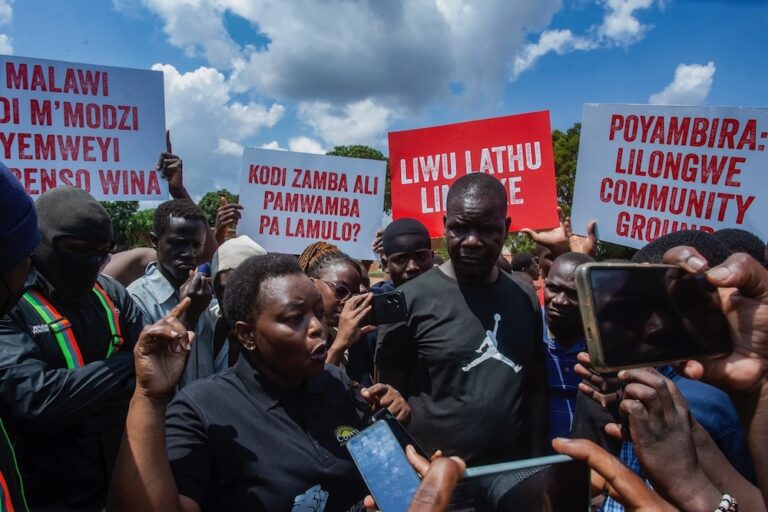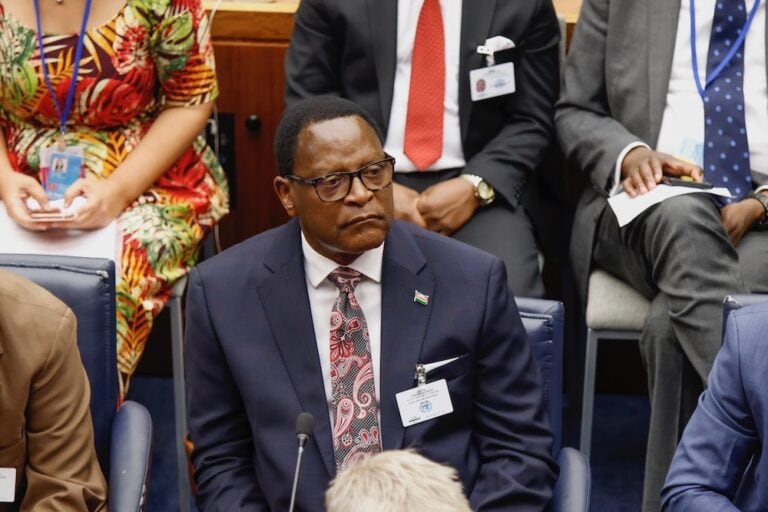(RSF/IFEX) – RSF is expressing its deep concern about the harassment of privately-owned newspapers. According to RSF’s information, on 21 August 1998, Adson Harare and Kumbweza Fumulani, respectively editor-in-chief and senior reporter of the critical weekly newspaper “The National Agenda”, were brutally assaulted by four men as they were arriving at Fumulani’s home in the […]
(RSF/IFEX) – RSF is expressing its deep concern about the harassment of
privately-owned newspapers. According to RSF’s information, on 21 August
1998, Adson Harare and Kumbweza Fumulani, respectively editor-in-chief and
senior reporter of the critical weekly newspaper “The National Agenda”, were
brutally assaulted by four men as they were arriving at Fumulani’s home in
the evening. The gang asked the two journalists who owned “The National
Agenda” and why the paper was so critical of the ruling United Democratic
Front (UDF) party. Dissatisfied with the answer, the men beat up the
journalists and left them for dead. Harare and Fumulani, who sustained
severe injuries from knife wounds and blows, were treated in unnamed
hospitals for fear of reprisals. According to “The National Agenda”, the
agressors were allegedly UDF agents, which the UDF has not denied.
On 18 September, the Registrar-General of Malawi issued a ban order for “The
National Agenda”, arguing that the directors of Chikonzero Publications, the
parent company of the newspaper, registered false names when they were
obtaining their business licence. A High Court injunction set aside this ban
order the following day. However, this measure seems to be discriminatory
against “The National Agenda” because pro-government publications such as
“Dziwani” and “Time Weekly” have in past weeks been publishing without proof
of who the real owners are. On 5 October, Brian Mungomo, columnist for the
“Daily Times”, was arrested on charges of giving false information to a
public officer, publishing a false document and obtaining a business licence
by fraud. Mungomo is detained as the alleged director of “The National
Agenda”.
On 18 September, Dingi Chirwa, editor of “The New Vision”, was arrested and
beaten by the police before being released on bail. The journalist had
published an article entitled “Nine bombs found in Lilongwe” in the 1 to 4
September edition of “The New Vision”. The Media Council was asked to
mediate between the newspaper and the Malawi Police, as the latter claimed
that the article contained false information that could lead to a breach of
the peace. Chirwa was arrested while the Council was in the process of
mediating.
At the end of September, Bright Sonani, a reporter with the “Daily Times”,
was threatened with death by four men as he was taking pictures of a
university graduation ceremony in Zomba (60 kilometres north of the capital,
Blantyre). His camera was snatched and the film removed. According to the
journalist, one of the men said that they should beat him up since he was
“fond of writing stupid stories about the president and the UDF.” The “Daily
Times” also said that its reporters, driving back from Zomba, had spotted
three of these men in a vehicle belonging to Eric Chiwaya, UDF District
Governor. The UDF has not denied this.
Recommended Action
Send appeals to the President:
Civil and Political Rights, Article 19 of which guarantees the freedom to
inform and to be informed
Malawi
assaults on journalists and also that those responsible are punished, even
if they turn out to be UDF agents
National Agenda”
work before seeking any legal recourse
Appeals To
President Bakili Muluzi
Office of the President
Sanjika Palace
Blantyre, Malawi
Fax: +265 635 644 / 634 681
Please copy appeals to the source if possible.


